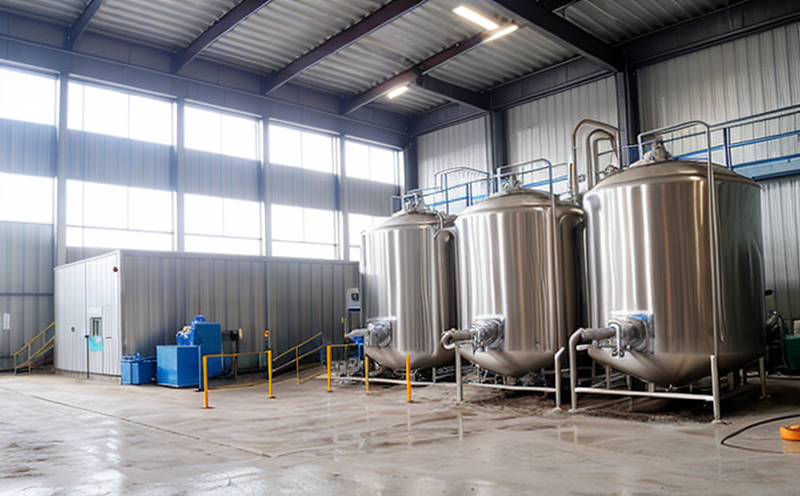APHA 2540D Total Suspended Solids Test in Industrial Water
The APHA 2540D test is a critical tool for industrial water quality management, ensuring that water systems meet stringent environmental and operational standards. This method measures the total suspended solids (TSS) content within industrial waters, which can include process water, cooling towers, or wastewater streams. Suspended solids are particulate matter that remain in suspension in liquids like water, and they play a significant role in determining the clarity and purity of the water.
Industries with stringent water quality requirements often rely on TSS measurements to monitor performance and compliance. For instance, power plants use large volumes of cooling water, which can accumulate suspended solids leading to fouling issues. Similarly, paper mills generate significant amounts of wastewater that must be treated before discharge. By measuring TSS levels, these facilities can adjust their processes in real-time to maintain optimal water quality.
Compliance with international standards is paramount for industrial operations. The APHA 2540D method aligns closely with ISO and ASTM guidelines for water testing, ensuring consistency and reliability across different industries. This method specifies the use of a filtration technique combined with drying to obtain an accurate measure of TSS. Proper sampling and specimen preparation are crucial steps in this process.
The test involves collecting a representative sample of the industrial water under controlled conditions, filtering it through a specified filter, and then drying the collected solids at 103°C for 24 hours to ensure complete drying. The weight of the dried filter is measured precisely, and this value represents the total suspended solids content in the sample. This method provides a quantitative measure that helps facilities identify potential issues early on.
Real-world applications of APHA 2540D testing are widespread across various industrial sectors. For example, in the food processing industry, TSS levels can indicate the efficiency of cleaning and sterilization processes. In pharmaceutical manufacturing, maintaining low TSS levels is essential for product quality and patient safety.
Quality managers and compliance officers use this data to ensure that their operations comply with local and international regulations. R&D engineers also rely on APHA 2540D testing results to optimize water treatment processes and develop new technologies aimed at reducing TSS levels in industrial waters.
- Power plants: Monitor cooling tower water quality to prevent fouling and ensure efficient heat transfer.
- Paper mills: Track wastewater treatment efficiency before discharge to meet environmental regulations.
- Pharmaceutical companies: Ensure that TSS levels are within acceptable limits for product safety and regulatory compliance.
Scope and Methodology
The APHA 2540D method is designed to measure the total suspended solids in water samples, providing a quantitative assessment of particulate matter. This test is particularly useful for industrial applications where water quality must be consistently monitored and maintained at optimal levels.
To perform this test, follow these steps:
- Collect a representative sample of the industrial water in a clean container under controlled conditions to avoid contamination.
- Filter the collected sample through a pre-weighed filter with a specified pore size and retention limit. Ensure that the filter is compatible with the method's specifications.
- Dry the collected solids at 103°C for exactly 24 hours in an oven or drying cabinet, ensuring complete evaporation of water content.
- Weigh the dried filter to determine the mass of total suspended solids. Record this value accurately.
The method also includes guidelines for handling and storing samples to prevent contamination, as well as recommendations for equipment calibration and maintenance.
International Acceptance and Recognition
The APHA 2540D test is widely recognized and accepted by various international standards organizations. It aligns closely with ISO, ASTM, EN, and IEC guidelines for water quality analysis, ensuring consistent and reliable results across different industries and regions.
Many regulatory bodies worldwide have adopted the APHA 2540D method as a standard practice for measuring TSS in industrial waters. This includes environmental agencies responsible for monitoring wastewater discharge, health authorities overseeing drinking water supplies, and industrial organizations ensuring process water quality.
The widespread adoption of this method reflects its reliability and accuracy. Industries that adhere to these standards can demonstrate compliance with international best practices, enhancing their reputation and operational efficiency. The consistency in results across different laboratories ensures that the data is comparable and actionable for decision-making purposes.
Competitive Advantage and Market Impact
- Innovation Leadership: By staying ahead of regulatory changes, companies can innovate and implement advanced water treatment technologies that reduce TSS levels more effectively.
- Cost Efficiency: Early detection of TSS issues through regular testing allows for proactive adjustments in operational processes, saving costs associated with downtime or remediation.
- Brand Reputation: Demonstrating compliance and superior water quality can significantly enhance a company's reputation among customers and stakeholders.
- Regulatory Compliance: Adhering to international standards ensures that companies are prepared for any audits or inspections by regulatory bodies, reducing the risk of fines and penalties.





